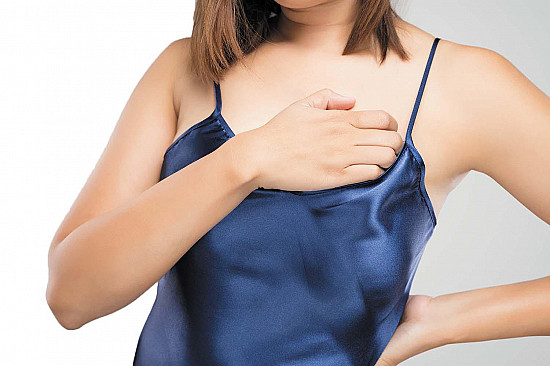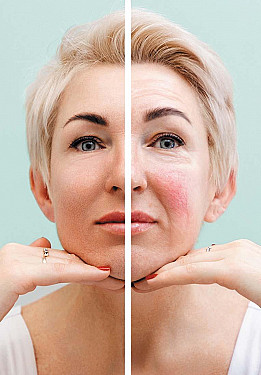
Driving with arthritis pain: Stay comfortable — and safe — behind the wheel

Daily cup of coffee may prevent afib recurrence

Gene-editing therapy lowers harmful blood fats in early study

What is EMDR therapy, and who can it help?

GLP-1 drugs versus bariatric surgery for treating obesity

Two dumbbells, three exercises, and 10 minutes

Easing the emotional burden of IBS

Modify your push-ups to meet your fitness level

What is long QT syndrome?

Stroke survivors may benefit from very low LDL levels
What's that smell? Get rid of body odor
If you notice a change in body odor, it could be a sign of a medical condition that needs treatment.
Have you ever caught a whiff of a foul odor after finishing an intense workout or spending an afternoon outside in the heat, only to realize the odor was coming from you? The smell goes with the sweat, and some of us give off a stronger and more pungent scent than others.
Most of the time body odor isn't a problem and a shower will quickly wash it away. But if you notice a change in body odor or you're sweating much more than usual, it could be a sign of a medical condition that needs treatment.
What causes body odor?
You probably notice body odor most when you're sweating. Your body has two main types of sweat glands — eccrine and apocrine — that release fluid (sweat) onto your skin's surface when you're hot. Sweat serves an important purpose. As perspiration evaporates, it cools your body temperature.
Eccrine glands are all over your body. Apocrine glands are in areas like your armpits and groin. They produce a thicker, milky fluid.
Sweat itself doesn't have a smell. The odor happens when bacteria come into contact with the perspiration your apocrine glands release.
What diseases can cause body odor?
People who sweat more than usual may be diagnosed with the condition hyperhidrosis. Primary hyperhidrosis is a relatively rare condition that happens without a specific cause. Secondary hyperhidrosis is related to a medical problem, such as hot flashes with menopause, an infection, or an overactive thyroid gland (hyperthyroidism). Stress, certain medications, and alcohol use can also cause you to sweat more than usual.
If you're still looking for a cause, look at your diet. Certain foods can change the way you smell. Cruciferous vegetables such as broccoli, cabbage, and cauliflower produce gas. The breakdown of garlic and onions in your body releases sulfur-like compounds that waft out through your pores. And people with a rare condition called trimethylaminuria develop a fishy odor after eating seafood.
How to get rid of body odor
The easiest way to eliminate body odor is by taking a bath or shower, which will remove bacteria from your skin. However, for many people a daily shower or bath may not be necessary. Showering a few times a week, especially after you exercise or do other activities that make you sweat, may be enough to rid you of body odor without drying out or irritating your skin.
After your shower or bath, apply an antiperspirant and deodorant. Most over-the-counter antiperspirants contain aluminum-based compounds that block your body's eccrine glands, preventing you from sweating. Deodorants repel the bacteria that cause odor, and may contain an additional fragrance. Some products combine an antiperspirant and a deodorant. If over-the-counter products don't control sweating and body odor, your doctor can prescribe a stronger prescription-strength antiperspirant/deodorant.
Wear clothing made from breathable fabrics such as cotton, silk, or wool and wash clothes after each wear. For exercise, you may prefer to wear moisture-wicking fabrics like polyester or nylon. You might also consider shaving your armpit hair, which allows sweat to evaporate quickly, before it can produce an odor.
Secondary hyperhidrosis treatment addresses the condition that caused the excess sweating. Treatments for primary hyperhidrosis include antiperspirants, botulinum toxin injections, and prescription medications. For sweating so severe that it affects your daily life, surgery can block nerve signals from triggering your sweat glands or remove those glands entirely.
Usually, body odor (as well bad breath) is more of a nuisance than a serious health issue. But if you find that you can't manage sweating and odor with lifestyle changes like regular bathing and antiperspirant/deodorant, ask your doctor or dermatologist for advice.
Image: RapidEye/Getty Images
Disclaimer:
As a service to our readers, Harvard Health Publishing provides access to our library of archived content. Please note the date of last review or update on all articles.
No content on this site, regardless of date, should ever be used as a substitute for direct medical advice from your doctor or other qualified clinician.

Driving with arthritis pain: Stay comfortable — and safe — behind the wheel

Daily cup of coffee may prevent afib recurrence

Gene-editing therapy lowers harmful blood fats in early study

What is EMDR therapy, and who can it help?

GLP-1 drugs versus bariatric surgery for treating obesity

Two dumbbells, three exercises, and 10 minutes

Easing the emotional burden of IBS

Modify your push-ups to meet your fitness level

What is long QT syndrome?

Stroke survivors may benefit from very low LDL levels
You might also be interested in…

Skin Care and Repair
New information on treatments for both medical skin conditions and cosmetic problems is available in the Special Health Report Skin Care and Repair. This report describes scientifically approved treatments for common medical conditions from acne to rosacea, as well as the newest cosmetic procedures for lines, wrinkles, age spots, and other problems. An explanation of the ingredients in popular skin lotions and cosmeceuticals is also included.
Free Healthbeat Signup
Get the latest in health news delivered to your inbox!
Sign Up





